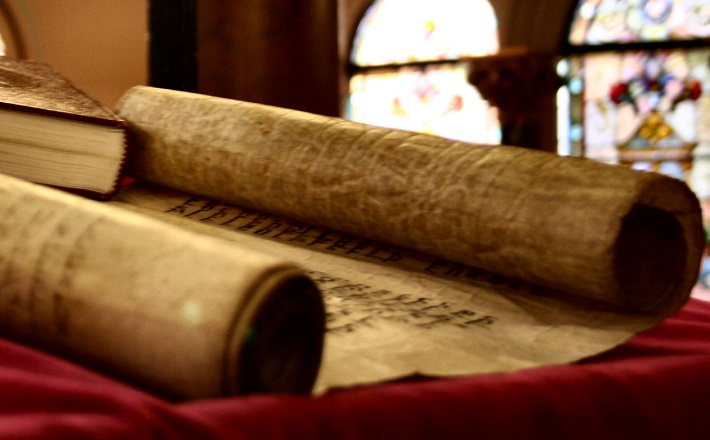Commentary on Luke 4:14-21
Luke 4:14-21 is the opening scene in the ministry of Jesus. It is Jesus’ manifesto for the work ahead.
Luke 4:14-15: Our passage opens with Jesus returning in the power of the Spirit to Galilee from the wilderness (Luke 4:1-13) where he had overcome temptation. When he returns, a report is heard about him throughout the region, and he travels around teaching in the synagogues.
The Holy Spirit in Luke’s opening narratives
Jesus’ work is accompanied by the Holy Spirit. The Spirit in Luke leads, fills, and empowers for prophetic work. Such characters as Zechariah (Luke 1:15, 67-79), his wife, Elizabeth (1:41), Simeon (2:25-32), and John (3:16) experience the Spirit and proclaim truth through the filling of the Holy Spirit. Jesus himself is filled with the Holy Spirit (3:22) who then leads him into the wilderness for a time of fasting and testing. So, when we see Jesus being led by the Spirit (4:14), we should not be surprised to encounter guidance, empowerment, and prophetic words.
Luke 4:16-17: In his travels around Galilee, Jesus finally comes to his hometown, Nazareth. It is described as “the place he was brought up.” It is the place where he was provided food and nourishment that allows growing and flourishing. When it is the Sabbath, Jesus does what he usually does, he goes to the synagogue. When he is there he stands up to read, which is the normal practice for reading Scripture in the synagogue,1 and he is handed the scroll of Isaiah. He opens it and chooses the place he wants to read from. Here we see the customs and habits of Jesus. He is one who regularly participates in the religious life of his community; he is a reader who contributes to the reading of Scripture in worship; and he is a teacher (Luke 4:15).
Nazareth
Craig Keener writes that Nazareth was an agricultural village that sat on a major trade route and was close to the Galilean capital, Sephoris, which was being rebuilt during the time that Jesus was growing up. Most likely, those who knew Jesus from his time growing up in the town were not surprised by his ability to read Hebrew.
Luke 4:18-19: Jesus chooses to read from Isaiah 61:1-2. Here it is helpful to focus both on the actual quotation from Isaiah and on the surrounding context in which the Isaiah quotations is found. Jesus reads a quotation that refers to the Spirit of God, the same Spirit who brought him to Nazareth. We know that the Holy Spirit in Luke guides and empowers people for prophetic ministry. In this quotation the Spirit of the Lord is resting on the speaker for the purpose of proclaiming good news to the poor — to those who are economically disadvantaged and marginalized. Along with the poor as a broad group, good news is also proclaimed to specific groups of people: prisoners, the blind, and the oppressed. All of whom might also be described as “poor.” What is this good news? It is news that this is the “year of God’s favor.” The year of God’s favor describes the Jubilee year when God will restore Israel.
The poor in Luke
This is the first mention of the poor (ptochoi) in Luke. But already we have seen that the powerful and rich are sent away empty, while the hungry are filled with good things (Luke 1:52-53). Those who are at the bottom of society are the Spirit’s chosen recipients of the good news. As the Gospel unfolds the poor will be identified as worthy hearers of the good news, as recipients of God’s kingdom (6:20), as a sign of Jesus’ ministry (7:22), and as invitees to the kingdom feast (14:13). The good news that Jesus proclaims, and thus the good news that Christians proclaim, must be good news to the poor, to the economically disadvantaged, and to the marginalized of our society.
The Jubilee
Every 50th year was to be set aside as a time for liberation and restoration when all Israelites would return to their ancestral land (Leviticus 25:10). Those who became poor were not to be taken advantage of nor taken as slaves but rather treated as hired hands and released at the year of Jubilee. Isaiah 61 was interpreted in first century Judaism as a reference to the Jubilee and the restoration it envisioned.
Luke 4: 20-21: When he finished reading, Jesus sat down [the usual posture for a teacher2], and the congregation fixed their eyes on him to hear his teaching. Jesus begins explaining the Scripture by telling them that today when they heard the Scripture read it was fulfilled in their presence. Jesus himself will be the location for the fulfillment of this prophesy. In the power of the Holy Spirit, Jesus is the one who has been chosen (anointed) to preach and proclaim the good news of God. In the chapters ahead, Jesus will travel from town to town and wherever he goes he will teach and heal living out the good news so that people can see the salvation that God offers.
As we finish, we can imagine a hometown congregation filled with all the characters of the village — rich and poor; seeing and blind; oppressed and oppressor — and wonder what this liberation looked like for them. Did they anticipate the good news would come first to the poor, the prisoner, and the oppressed? Or did they think it would come first for those with inside connections, the rich, and the religious? Jesus offers them good news. Will they hear it and receive it as good news to be shared with all, especially the vulnerable? Or will they hear it and hope that it is a message for them alone? Are they hoping that as Jesus’ hometown they will receive special favor? Exclusive favor? Or does their hope extend to the whole world?
Notes:
1 Craig Keener. The IVP Bible Background Commentary. Downers Grove: IVPress, 1993, 199.
2 Ibid.


January 24, 2016